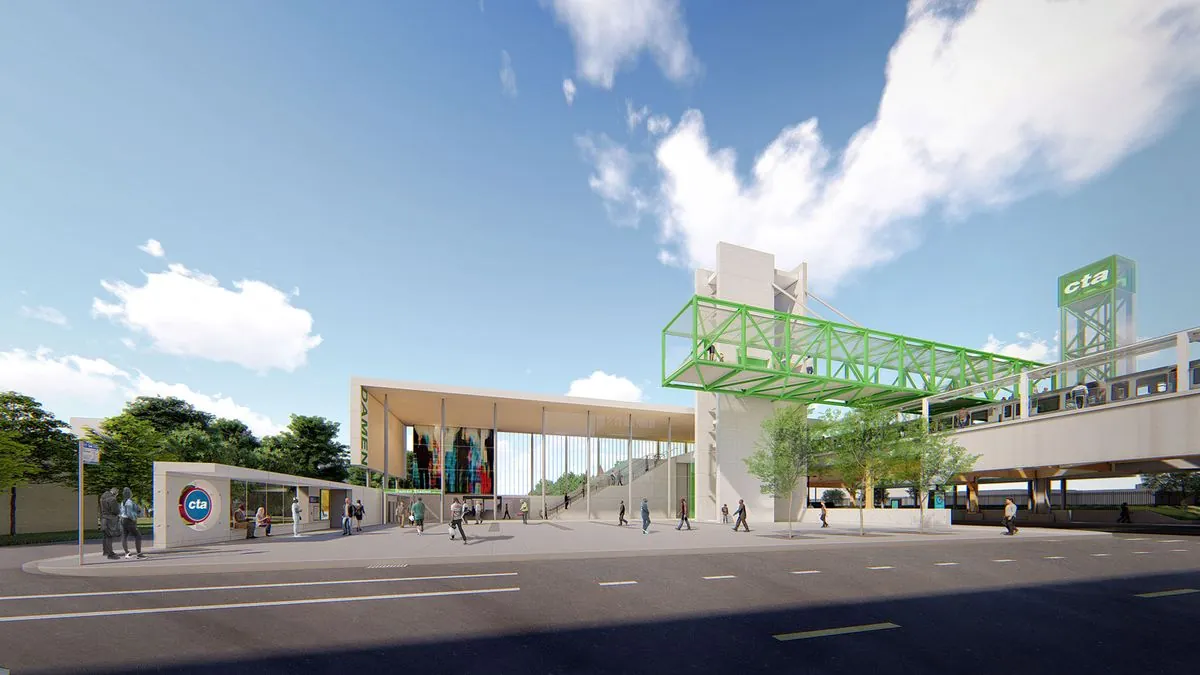In a significant development for Chicago's public transportation system, the city has reopened the Damen green line L stop, a long-shuttered elevated train station near the United Center. This reopening, accelerated by the upcoming Democratic National Convention, marks a crucial improvement in the city's transit infrastructure.
The Damen station, which had been closed since 1948, now fills a 1.5-mile service gap in the Chicago Transit Authority (CTA)'s network. This reopening is particularly noteworthy as the Chicago "L" is the fourth-largest rapid transit system in the United States by ridership and the second-oldest in the Americas, having first opened in 1892.
The newly renovated station boasts modern amenities, including wooden ceilings, a colorful mural, and a glass pedestrian walkway offering views of the Chicago skyline. Its location, less than half a mile from the United Center, is strategic for the upcoming Democratic National Convention. The United Center, home to the Chicago Bulls and Chicago Blackhawks, will host many of the convention's high-profile events.
Alderman Walter Burnett, who had long advocated for the project, acknowledged the convention's role in expediting the station's completion. He stated, "It was on target to get done, but the DNC made it quicker."
While cities often prioritize infrastructure upgrades for major events, it's rare for them to initiate entirely new projects solely for political conventions. Victor Matheson, an economics professor at the College of the Holy Cross, notes that there's often "a lot of political will" to accelerate planned upgrades to impress out-of-town guests, even for short-duration events.
"Chicago is ready to host the world ... so this station comes at a perfect time."
The impact of conventions on infrastructure has been observed in other cities as well. Cleveland, for instance, accelerated several projects, including airport upgrades and a downtown park, in preparation for the 2016 Republican National Convention. David Gilbert, former CEO of Cleveland's local host committee, emphasized how these improvements showcased the city's readiness to host major events.
It's worth noting that Chicago has a rich history with the Democratic National Convention, having hosted it 11 times, more than any other city. The last time Chicago hosted the event was in 1996, making this year's convention a significant return.
While the convention has undoubtedly influenced the timing of the Damen station's reopening, city officials have emphasized its long-term benefits for underserved residents on Chicago's South and West sides. This aligns with the broader purpose of the Chicago "L" system, which comprises 145 stations across eight different lines, serving the city and some surrounding suburbs.
Some residents, however, have expressed mixed feelings about the convention's role in the project's completion. Rider Angelica Arzuaga commented, "I feel like it shouldn't be the main fuel for projects like this. It should be the communities and the people who live in them."
As Chicago prepares to welcome delegates and showcase its revitalized infrastructure, the reopened Damen station stands as a testament to the city's ongoing efforts to improve public transportation and serve its communities, while also rising to the occasion of hosting a major national event.
